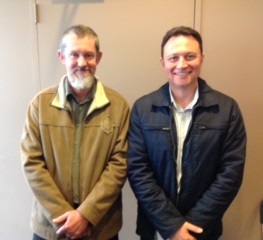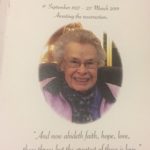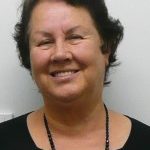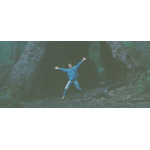My Aunty Connie, was the second daughter of Richard Pryor Williams and Alice Maud Williams (Dangerfield), my grandparents, and she was born on the 9th Oct 1919 and named Bessie Constance Margaret Williams. Aunty Connie was a rebellious and troubled child. She was born in the little country town of Pinnaroo in the ‘Mallee’ region of South Australia. Life was pretty tough for the Williams family as it was for many families in those days.

Jean Mavis Williams (my mother) was Connie’s older sister and this picture was in an oval frame and was on the wall above the fireplace in our home at 12 Kenilworth Road Parkside.
The great depression was felt by all and most people were struggling to eke out a living during the unforgiving droughts that often characterized the period from 1915 to 1922.

Richard Pryor Williams was Jean, Connie and Rhonda’s father. He was the “minstrel boy” of an earlier story
Richard Williams, Jean, Rhonda and Connie’s father had a milk round and family life revolved around the successful delivery of the milk.
To make things even more difficult for the family, Connie’s mother Maud had Tuberculosis. As the disease progressed, for a time Maud had to leave her home and go to live at Kalyra, a sanitarium for Tuberculosis sufferers in Adelaide. When finally, Maud came back to live with her family in their house at Pinnaroo, a separate room had to be built on the side of the Williams house to keep other family members from the possibility of contracting the disease through contact with Maud.
When my grandmother finally died in 1931, the Williams family was forced to split up. Jean, my mother, when she married my father, Maynard O’Connor in 1934, moved to Mylor to live. Ronda and her Grandfather Joseph Dangerfield went to live with Harry and Emma Dangerfield’s family at Gawler.
That left Connie who had no other option than to go with her father, Richard Pryor Williams, to live in rented rooms with him in Adelaide. Rchard was in many ways a “good” father, hard-working and diligent, but he severely sexually abused both my mother and my Aunty Connie which affected them greatly throughout their lives. Rhonda was the “lucky” one because she went to live with the Dangerfield family who loved her and cared for her and she suffered no such abuse.
(I write this, firstly, because it is true and it happened, and also to show that such abuse, although rarely reported, did exist in this earlier generation. In the present time of 2016, such abuse is much more likely to be reported and punished and I am glad that it is, glad that such crimes because crimes they are, are not so easily hid. It grieves me that I have to write such things about my own grandfather, but my mother told me that she never left me alone with him when he used to come to visit because she could not trust him not to harm me if he got the opportunity. In a previous chapter I mentioned too how my brothers were abused in the Salvation Army boys home way back in 1948, so abuse was alive and well in those days).
In my quest to find out more about Aunty Connie and the life she lived when she left Pinnaroo with my grandfather and moved to Adelaide I am visiting her today, 7th Sept 1999, at her retirement village on Grand Junction Road at Enfield.
Aunty Connie is now 80 years old and I am 60 years of age.
I knock on my Aunty’s door and wait for her to answer. The door opens and there is my Aunty Connie. She can’t be any more than 5’ 1” or 2” these days. I have noticed that when a person grows older their spine seems to shrink and they can lose inches in height. I know, because I too am losing height. I used to be 5’ 5” and now I am sure am less than that measurement.
“Hello, Aunty, how are you?” I ask as I walk in through the door.
“Oh, not too bad for an old lady,” she laughs.
Aunty Conne has a little dog that now skitters around our feet barking in a high pitched yapping voice.
“Out of the way Tinkle,” said Aunty Connie pushing him with her foot.
“Let’s sit at the kitchen table and I’ll get you a cup of tea.”
After the usual pleasantries and a cup of tea and biscuits, I got down to the purpose of my visit.
“Aunty Connie, you are getting older and although you will probably live for years and years, I would like to hear some stories about your early life at Pinnaroo and then what happened when you moved to Adelaide to live with grandpa, would that be all right?”
“ Oh dear. Well I’ll do my best, but I am suffering from a little loss of memory these days. I’m eighty years of age this year you know.”
“Yes, I know. Perhaps you can tell me first about your children, my cousins. It is ages since I caught up with any of them. What are they all doing at the moment?”
“Shirley (Downs), your cousin is holidaying in WA with her eldest son who has married a Western Australian girl. They have purchased a small farm, about four acres of land, north of Grand Junction Road, on the Angle Vale Road, I think it is. They have dogs that they run on the property. My son, Bob Candy still lives on Swan Street, West Beach and Ronnie Candy has a financial business and spends a lot of time tramping around Australia and overseas. David lives near me at 92 Hancock Road, Vista I think is the suburb, and my daughter Jill and her husband still live in my old home in the Kertaweeta Street Black Forest. They are having another baby and Jill is none too pleased about it. It will be her 4th. She has two boys and a girl at present.
Jill comes out to my place twice a week. She takes me shopping on Thursdays and takes me out on Sundays for a drive or such and then home to her place for dinner. I tell her that ‘the old boy upstairs’ was looking after me when he let me conceive her; though I wasn’t too grateful at the time! Her husband Jeffrey Brown is so caring. He spends a lot of time with me and cleans my house and looks after the garden. He does it for his own mother too. He is quite amazing for a man. Everyone here at the Elderly citizen’s homes are jealous of me and ask me how I managed to have such a wonderful daughter and son-in-law.
“The others are all pretty good too, but they’re not quite like Jill, because she is just one out of the box. Shirley has to wear a brace and can’t bend over at all. Her husband has made her a lot of tools to help her cope with everyday tasks like putting on her shoes for instance. Shirley and her husband are on pensions so they are able to spend a lot of time in Western Australia with her son. I see Ron on rare occasions when he is in Adelaide. David and Ada when they are in Adelaide come to see me pretty regularly too.”
“That’s good, Aunty Connie, It is wonderful that Jill and Jeffrey look after you so well. Can you tell me what your life was like when you were a child at Pinnaroo?”
“Mum died when I was 11 years old and she was in Kalyra with Tuberculosis for 2-3 years before that, so I was only 9 when she left and I was 11 when she died, so I have very little memory of my mum really because I was too young. I do remember she was a tall and slim woman and she had the most lovely voice. Not a harsh scraping voice like mine, but a singsong sort of voice. I can remember her singing Ronda to sleep. Ronda was five years younger than me. I loved to sit there listening to her sing. She was in Kalyra for a couple of years and I was not quite 9 when she went away. She was away for 19 months.Then she wanted to come home so badly but couldn’t unless she could live separately from the family.
Dad and Grandpa built on a room down the side of the house, a wooden place with walls that were only 4’6″ high. They were covered walls and then the rest of it had to be meshed wire right around because she had to have fresh air all the time. We had to put shutters around so that you could close against the wind and the rain. They used to be opened up and they had long metal rods that would hook onto the window sill down below, but the windows would be up during the day if it was wet or anything. Nobody was allowed to go to her but Jean and me because we had the dairy to consider. I got out of the dairy work, which suited me, because I helped look after Mum. Jean and I prepared her meals and fed her. We had a big metal bucket, a big round thing with handles on it and it was aluminium. I had to fill this with hot water and take it out there and put towels on the bed and sponge Mum all over and wash and dress her in the morning before I went to school and also give her breakfast. The best part was that it got me out of working in the dairy. To do that work we employed a couple of boys to do the heavy work. Generally, I looked after Mum, Jean did the housework and Grandpa Joseph Dangerfield did the cooking and we all helped with delivering the milk. I’d be rushing to get to school by 9 o’clock after looking after Mum. I once said to old Bob Pocock the school teacher,
‘If you want milk delivered to your house, you’ve got to put up with me being late.’
Old pig he was, a horrible man! And he was like that at home too, his wife was always being told off.
“Maynard O’Connor who eventually married Jean was a Catholic and Mum was a Methodist and I think they met at basketball or maybe tennis.”

A plate that was in Aunty Connie’s room. The woman in the picture is her mother, my grandmother, Alice Maud (Maud) Williams (Dangerfield)
Dad wasn’t too happy about Maynard. He said, ‘I’m not going to have any bloody Catholics in my house.’
“After a while, Mum joined up with the Christadelphian’s and then Jean began to go there too. The Adelaide Christadelphian’s used to send Christadelphian’s up each weekend from Adelaide. Mum talked Maynard into coming to see what it was like and gave him books and things. It was all different to what we had learned, but it made a lot of sense too. Maynard gave up being a Catholic and became a Christadelphian, but me, well I nicked out of the whole lot. I left the church and never went to the Methodists. I used to walk around with the Salvation Army because I liked the music, but wouldn’t go to the church.
“Then Maynard came to live at our place when grandpa went to live at Gawler. Maynard took over the two rooms where Grandma and Grandpa Dangerfield used to live but he used to come into our kitchen for meals. He paid his board to Dad.”
“Dad said to Maynard,
“I don’t know whether you should be here with the girls when we are not at home,”
and Maynard said,
“Jean and I are going to get married,”
and Dad said
”You haven’t asked my permission.”
And Maynard said,
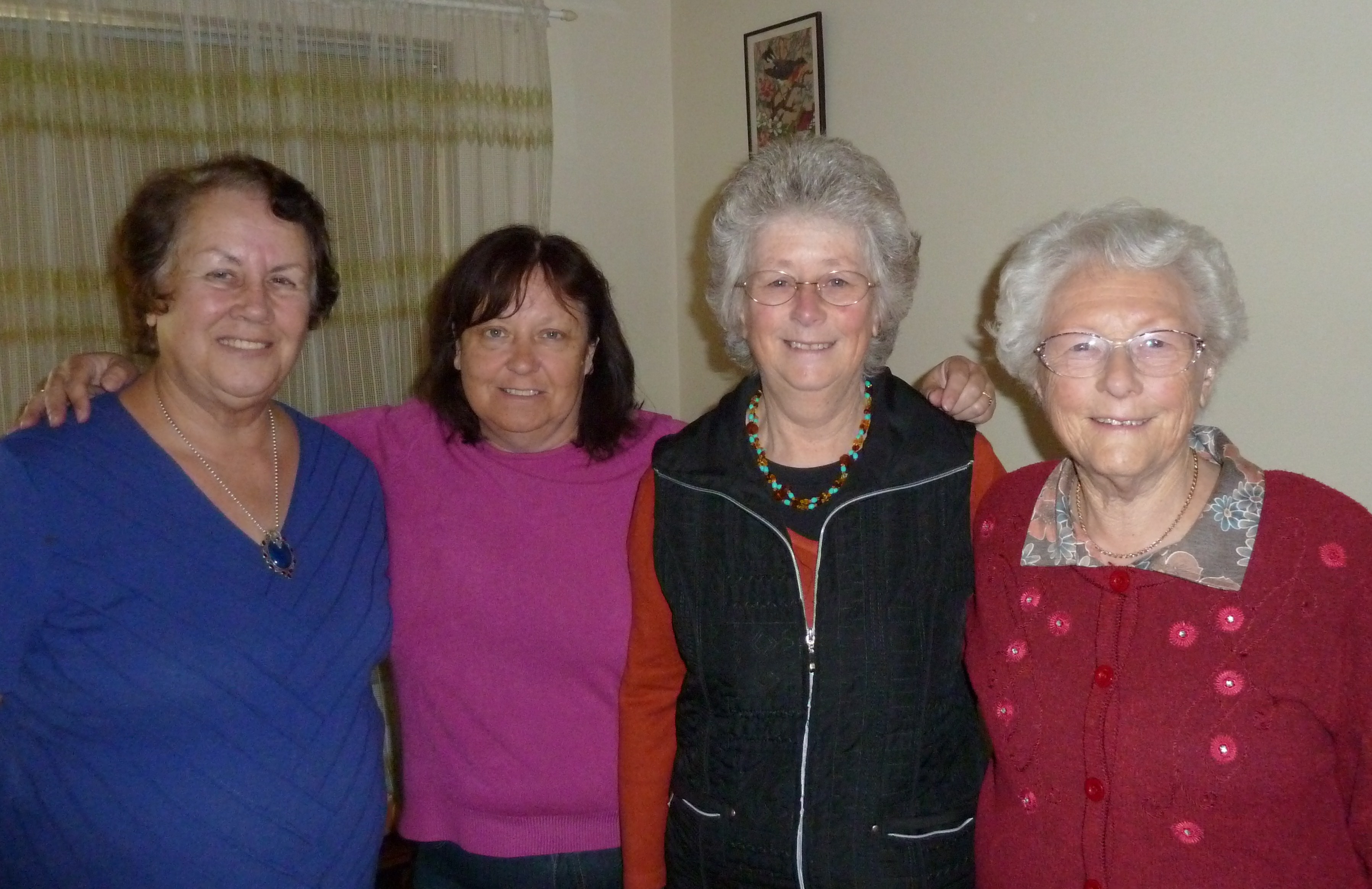
Fay Berry (O’Connor), Jill Brown (Candy), Kathy Billing (Critchley) and Rhonda Critchley (Williams) my Aunty and my two cousins.
“Well you haven’t given me a chance to ask your permission, but we are going to get married anywaDad really didn’t like Catholics. He used to deliver milk to the convent and he had to go around the back once and he saw a Nun feeding a baby and he didn’t think much of that at all. Jean had converted Maynard to be a Christadelphian. Jean was friendly with the people from the church and so when Jean and Maynard got married they went to Mylor which is near Adelaide and stayed with one of the Christadelphians who owned the property they lived on at Mylor. They were trying to grow Lucerne on the land there but after a while Jean didn’t like living out there on her own so they left there and rented a place in Adelaide in Halifax Street, just up from the Christadelphian Church and Maynard went back to Blacksmithing in a garage on Glen Osmond Road Frewville. Later they rented a house at 12 Kenilworth Road Parkside which was a little row cottage at the back of the Parkside Primary School.
“As I get older my memory fades. I have written a lot of stuff in a notebook (Oh where is that notebook, I would so like to find it). After Joe died so much had to be gotten rid of, Joe had so many books. I turned Joe’s bedroom into a sewing and knitting room. Lots of stuff has had to go, but there is still a lot of stuff there.

This was the last time we saw Auntie Connie and I am so glad to have this picture of the two sisters and me together. Photos are such precious things and keep memories alive.
“Well up until 1932, my life was pretty ordinary. We lived in Pinnaroo in a house just opposite the school. The Dangerfields used to have a farm north of Pinnaroo. When Aunty Bessie Dangerfield married Fred Arthur, Mum (Maud) came to live in the Pinnaroo township because we kids had to go to school. The menfolk used to have to go back and forward to the farm or else they would stay overnight a couple of times if it was seeding time, or reaping time. But Mum and Dad had the town house and Dad was a cripple, his back was all bent over, so he worked in a store.

Not sure which one of the rellies is the man on the left, then Fay, and cousin Bobby Candy, Aunty Rhonda and daugher Raelene Eatts and Cathy Billing.
“Mum was a seamstress before she was married and used to take in dressmaking and later became a dressmaker and used to make wedding dresses and other clothes for people. We were all well-dressed. She used to buy remnants and left overs from bulk material in shops and make stuff for us and used to sell stuff to private people. She spent most of her time at the machine. Jean and I had to do most of the housework even before she was really sick and deliver the milk I never had time to do homework and I used to do all that at recess time. It was a hard life!
“When Mum died and Jean got married to Maynard O’Connor and Ronda went to live with the Dangerfield’s at Gawler, then my Dad, Richard Pryor Williams took me down to Adelaide to live. I had to go with him because there was nowhere else for me to go, so we lived in shared accommodation.
“That would have been so hard on you Auntie Con.”

This is all the relatives who were at the funeral of my dear Aunty Connie. Again I am so glad I took this photo. Just wish I was in it as well.
“Well it wasn’t a walk in the park, that’s for sure, not with my Dad. Everywhere we went we soon had to move on. People used to tell me that I should get away from him because it would rub off on me and people wouldn’t want me around either. Ronda was okay. She went to live with the Dangerfield’s. Jean and Maynard married and went to live at Mylor. They lived there for a while and then because of the difficulty of getting jobs, Maynard became a blacksmith and worked for himself. He bought a house on Glen Osmond Road and built a factory and lived there. I got work at a boot factory and dad and I went to live at Parkside. My father managed to get work at the University of Adelaide in their animal nutrition section. We shared a house with three girls and we had half the house which was two rooms. These girls had two brothers, twins, and when the twins left school we had to move out so they could move in.
“Not long after that I met Ron Hill and we went together for six months. He didn’t have work for a while, but then he got a job so we shifted away into a place of our own at Plympton. Then Ron got ulcers that perforated and he bled to death. Ron’s sickness was attributed to working at Islington and getting the fumes from welding in his lungs. I was left with Bob and Shirley and I was pregnant as well. At that time, everything in my life just seemed to fall apart. After Ron was born, I went to live with Ron’s parents for a while and then the little house opposite where they lived became vacant. The house belonged to a friend of my Father-in-law and so I got that little house on Anne Street, Stepney to live in. It was on the corner of Anne Street and Laura Street, Stepney. My father was still working at the university and living in a house down by the Maid and Magpie Hotel just on the edge of the city of Adelaide. Dad was just renting one room. Then the owner wanted that room. In the meantime Ron had died so Dad came to live with me on Anne Street.
“Two or three years later, I met Joe and we got married. Dad purchased two caravans and lived at the back of the Black and White taxi depot which was near the University. He was still working in the Animal Nutrition section at the University. Then Dad got a perforated ulcer and bled to death. He had caught pneumonia from animals and that’s what actually took him in the end.
“I remember I visited grandpa when I was just a girl when he lived in those two caravans at the back of the taxi depot.” I said.
“When I met Joe, he was so different to anyone I had known. He was a real gentleman. I was living on Anne Street and my In-laws lived opposite me. Joe was married to their niece and she just ‘ticked off’ one day. Then Joe used to visit the Hills because he was very friendly with them having been married to their niece. Living opposite as we did, that’s how we got together. He treated me very well in those days. When he had his strokes they affected him so much that his personality altered and it was then like living with a completely different person. When I had Jill there was 9-10 years between Jill and David, and Joe was very good. He would get up to the baby and things like that when I wasn’t well, but he wouldn’t change nappies!.
“Joe has been dead now for 5 years. He was in a nursing home for a couple of years before he died. It was a great relief for him when he died, but I miss him. He changed completely after his stroke because his memory was gone. He didn’t know who I was. Then he said, ‘you’re Connie, aren’t you,’ and his memory gradually came back. I said ‘Who did you think I was – one of the nurses? No such luck’ I said to him, ‘I’m not getting paid!’ I used to read the papers to him and feed him lunch. He was nicer as well, fantastic in fact. If he had been like that all his life it would have been heaven to be married to him. Joe wasn’t a hard man, just withdrawn. He internalized everything and never showed affection. We got on all right though. He didn’t sleep in the same room as me and that’s not married life in my opinion. I was 45 when he stopped sleeping with me. He said ‘I’m not sleeping properly. Every time you move I wake up and then I can’t get back to sleep.’ I said ‘then let’s get twin beds,’ but no, he wanted to be on his own.
“He used to write a lot, anything that came into his head. Things about when he was a child, or when he was in the air force, he was always writing. When he died, I read some of it. Some of it was so pathetic. His time in the air force, seeing his mates killed in front of him, he never got that pain out of his mind. Although they were in Darwin, a terrible lot of bombing was going on up there. I didn’t realize what a terrible time they were having. He was a telegraphist and all the messages had to go out. Chaps would have to keep on shifting their place for fear of the bombing. When he came back, the least bang would frighten him. It took him a long time to get over that. When he had to go into the nursing home, I used to spend a lot of time with him. I’ve got used to talking to myself, and the cat and the dog would get a dressing down now and then. If the cat is outside in the back yard, Tinkle won’t go out because Bennie scruffs her and so she is frightened of him. I give him a kick in the backside when I see him do it in here.
“Eventually Joe had to go into a nursing home and he hated it and tried to run away, but once they got him onto medication he was a lot better. It was only the seizure that had made him so different and difficult, but it was still so hard on me. His nursing home was alongside the village where I now live and I used to go up to see him every day. He was now so gentle and so pleased to see me that it was very nice. Jill and David don’t remember any of the bad things – the way he was before. They only remember the good things. They don’t know about his tantrums and all that sort of thing. I hid it from them. By the time he was in the nursing home, Jill was older and so she didn’t see the bad times. David came to see dad and he was so amiable in fact quite loving. He wanted to hold me then, that’s all he wanted. It wasn’t his fault, it was because he went through hell during the war up in Darwin. That altered his personality and changed him so much. But I’ve got no real regrets about having Joe in my life. I got David and Jill didn’t I? I wouldn’t have had them otherwise. And what would I have done without Jill? Jill is such a wonderful and good-natured girl. She hopes her new baby is a girl and so do I.”
It was time to go because I could tell that Aunty Connie was getting tired with all the remembering. During our conversation I could tell that she was also ‘losing it’ a little. Old age is so sad. It is bad enough when the physical things begin to get harder with arthritis and such, but when the mind starts to wander, that is sad.
“Well thanks for telling me your story Aunty Connie. I will treasure the information you have given me. Thank you. Goodbye, and I will call on you again soon.
I rang Aunty Connie again on 17th May 2001 and this is what she told me.
” I have a few problems these days. I had a fall and had a big lump under my chin. Jill and Jeffrey came out to help me. Jeffrey is so very caring. He does the shopping with me and holds onto my arm. When he can’t come, Jill comes and she pushes the cart around as we do the shopping. Her son James is now 11 years old, Thomas is 9 years, and Imogen 7 and the baby girl is 12 months old. Jill still lives at Black Forest and Shirley is north of where I live and she comes over quite often. Her husband has had some strokes so she can’t stay for very long. He has improved so much since he had the strokes. He used to be so sarcastic and generally difficult, but he is not like that now, he is different all together. Shirley says it is like having a new partner because they get on so well and he is so thoughtful now, and is a pleasure to be with.”
“That was my last conversation with My Aunty Connie until just a few days before she died. I visited her at her unit at the end of Kertaweeta street where her daughter and son-in-law live. I took some photos and got a couple of beautiful ones of Aunty Con and some photos of other members of the family. Aunty Ronda is the only one of the three sisters still living. My Aunty Connie died on 14th Nov 2011 and I visited her in her unit near Kertaweeta Avenue Black Forest where Jill lives just a few days before she died, and I wrote the following:
“My Dear Aunty Connie, as I look down at your lovely, soft, sweet face and think of your hard life I wonder how you still remained so gentle and loving. None of the bitterness there could have been is evidenced in your unlined face. That’s what I notice, Aunty Connie, you have so few wrinkles. Your skin is beautifully clear and young for someone who is 92 years of age. Well, my dear lady, I still have some memories in my head about you that are not recorded here right now, but they will still be there for a later time when I get to write it all down. I hope those who read your words can feel some of the love I have for you, and for your two lovely sisters and especially for your lovely mother who I never met but so badly want to meet at a time in the future when we will all meet again. I love you, Dear Aunty Con, with all my heart, Your loving niece, Fay
So that pretty well wraps it all up and is the end of the story of the O’Connor’s, the Thoday’s, the Cooper’s, the Dangerfield’s, the Laube’s and the Williams. It has taken me a year to write these ‘chronicles’ but I am sure there is a lot more that I could have written or should have written. This history is as accurate as I could make it but considering much of it came down to me by word of mouth there will be a whole raft of inaccuracies I am sure. If anyone knows more about things than I do, then send me your corrected copy of my story and I will be delighted to receive it. Maybe my next task is to write my own story. We shall see! I hope you have enjoyed the ride with me. It all began with my little writing set with the blue bunnies that my mother gave me which inspired me to write when I was just 8 years of age and has ended with my dear Aunty Connie’s death on 14th Nov 2011.







